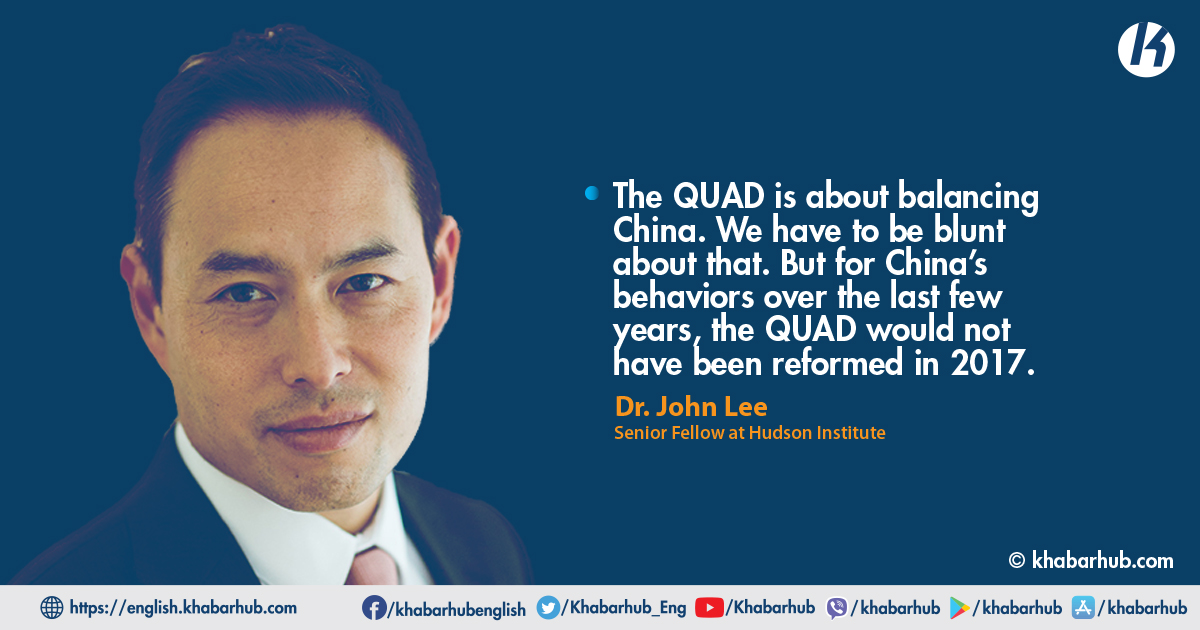Dr. John Lee is a Senior Fellow (non-resident) at Hudson Institute and an adjunct professor at Australian National University and the University of Sydney.
From 2016 to 2018, he was senior national security adviser to Australian Foreign Minister Julie Bishop. In this role, he served as the principal adviser on Asia and for economic, strategic, and political affairs in the Indo-Pacific region.
Dr. Lee was also appointed the Foreign Minister’s lead adviser on the 2017 Foreign Policy White Paper, the first comprehensive foreign affairs blueprint for Australia since 2003 and written to guide Australia’s external engagement for the next ten years and beyond. He received his doctorate in international relations from the University of Oxford.
Dr. Pramod Jaiswal, Strategic Affairs Editor at Khabarhub, spoke to Dr. John Lee on the issues related to Indo-Pacific Affairs.
When it comes to QUAD, how parallel are the US, Australia, Japan and India’s aspirations and goals?
The QUAD is really about balancing China. We have to be blunt about that. But for China’s behaviors over the last few years, the QUAD would not have been reformed in 2017.
If you look at the membership of QUAD, the QUAD includes the 4 countries in the Indo pacific with the most capable navies. These 4 countries have all decided to counter and balance China.
It is an action-oriented group that isn’t slowed down by a very large membership and there are no already set up bureaucratic processes.
Also, outside the QUAD is well aligned with the region because it does not intrude on the diplomatic space occupied by ASEAN, for example. Now having said that, we have to be careful that Japan and Australia are American allies, while India is not.
So, I think one of the purposes of the QUAD is to help create a strategic platform and role for India to play a larger role and presence in the region and help balance China, bit more in the Indian Ocean rather than the East Asian maritime region.
As the final arrangements are being made for the leaders of four QUAD countries to meet in person in Washington on Sept. 24, what does the Quad summit signal for US engagement in the Indo-Pacific? Will the summit risk more assertiveness from the Chinese side in the region?
Well on the back of the alliance signed between US, UK, Australia or AUKUS which was announced last week, the QUAD meeting,
I think, is evidence that the US is genuinely focused on the Indo pacific and remember that this comes after the very disastrous withdrawal of the American troops from Afghanistan at the end of August.
Now, the reason for the withdrawal, from the American side was that they were going to be focused on the Indo pacific, so the QUAD comes at a time that allows the US and Biden administration to demonstrate its focus on the Indo-pacific.
I think the fact that it’s also a face-to-face meeting between leaders is significant. It’s in fact very significant. That broad strategic direction to focus on China and the Indo pacific needs to be given authority from the top level down. And I think it’s precise what president Biden is seeking to do.
China is already hyper assertive, so in a sense holding the QUAD is not an additional risk because China would behave in a way it is behaving now, in any event, whether QUAD or not. So, from that point of view, I don’t think that QUAD is at risk of increasing assertiveness. Chinese assertiveness can be fought at the meeting of the QUAD.
What hopes does Australia have from the new security pact AUKUS? What do you have to say about the entire ruckus over AUKUS? Does this indicate a new world order where ‘balancing’ is back?
Australia, I think, sees itself in a strategic period of time of immense importance and actually dangerous because of China’s behaviors.
This means that Australia is putting more and more reliance on groupings, actually prepared to take active risk to counter China, rather than focus on grouping with countries that simply agree that China is the problem or there is a problem in the region.
This is the basis for the alliance agreement AUKUS, which allows the three countries to pull their resources and know-how, and technology in defense industry areas.
It is about making good on the 2017 American decision to include the UK and Australia in the American National Industrial Technology base, which basically means that those countries are now able to share defense-related technologies with the US with minimal regulatory disruption.
Now with AUKUS, the focus with the announcement has been on submarines and Australia acquiring nuclear-powered submarines in particular.
But we have to realize that Australia is not due to actually acquire any nuclear submarines until the 2030s. The more immediate priority for Australia in AUKUS is actually the other weapons that can be jointly developed earlier, and this includes long-range missiles, hyper-sonic missiles, unmanned vehicles such as drones, offensive cyber capabilities, and military uses of Artificial Intelligence.
Australia thinks these capabilities will be required in the next 5 years not in the next 10 or 20 years but in the next 5 years, either against Chinese forces in a war in North-East Asia or more preferably to have the capacity to collectively deter China, i.e. acquiring these capabilities will prevent China from thinking about starting a war over Taiwan for example. So, this is where I think AUKUS will be important.
Now the ruckus is mainly caused by the termination of the submarine contract between Australia and France. I think this is related to AUKUS but it is really a separate issue from AUKUS.
AUKUS could go on with or without the submarine contract. So, I think the submarine contract is not really the sum of the problem.
Submarine contact is a separate disagreement between just Australia and France, and Australia, France, and the US, thus, I think AUSKUS is something different altogether.

What is Australia’s justification for scrapping the submarine deal with France? Has Australia seriously harmed itself in infuriating France?
Well, it’s obviously been a very unsettling decision by Australia, but on the submarine deal, the French design conventional submarines were to be brought into line sometime in 2035 to defend the waters quite close to the Australian territory.
There is now a reconditioning in Canberra that Australia needs submarines to potentially take part in the conflict further away from Australia, not even in South East Asia, but possibly North-East Asia, and also to provide a strategic presence for Australia further away from the actual Australian territory.
The conventionally designed French submarines would not have been in a position to do that so Australia felt that it had to take this difficult and controversial decision because producing these conventional French-built and designed submarines was not going to meet Australia’s new strategic interest.
Now more about the French nuclear propulsion technology in its submarines, even if the French submarines were to be turned into nuclear propulsion submarines, the French technology in nuclear propulsion is not as advanced as the American or British technologies in nuclear propulsion in submarines.
And in any event, I don’t think France would have given Australia the best nuclear propulsion technologies in its feature submarines.
So, for those reasons, I think Australia has taken the difficult but I think ultimately the strategically correct decision to change its supplier and developer of submarines.
How has Australia perceived France’s decision to recall its ambassador to Australia and the US?
Well, the French are understandably furious but I should note that there were provisions in the agreement with France for compensation to end the contract at various stages.
So, it was always conceivable for Australia to walk away from the contract and the French would have known that. I would also say in all frankness that the French were not meeting some key aspects of the obligations in terms of the timing and milestone developments of various stages of the submarine contract.
So, I think there was some dissatisfaction from the Australian side even before this new agreement. Having said that, I think Australia has been surprised that France decided to recall its Ambassador which is a very dramatic move by another western democracy.
However, looking ahead, although France is furious, Paris has to recognize that there is a broader competition occurring and France will need the US and UK, and even possibly Australia to confront aspects of China’s behavior in the Indo Pacific. So yes, France is angry but the broader challenge for France is not Australia but China.
According to you, is Australian diplomacy strong enough to support its strategic intentions?
It’s a very good question and it’s something Australia is currently thinking about and discussing. The diplomatic problem is that Australia is trying to respond very quickly to the changes in the strategic environment and AUKUS is a very good example of that.
What that means is that there is often not enough time to ensure that our diplomatic approach is where a lot of our strategic approach is.
As a result, our strategic approach has been changing rapidly and it often takes time for our diplomatic approach to catch up.
Hence, there remains a gap between Australia’s diplomacy and where we are headed strategically. The recently signed AUKUS agreement did catch the region by surprise and the region is reflecting as to what it thinks of that agreement.
Having said that, I think Australian external policy over the past 3-4 years has been driven more by the defense and intelligence officials and experts than it has by diplomats.
For this particular reason as well our diplomacy has not kept up with what we are doing. I would also say that Australia’s spending on our diplomacy has also decreased in the last few years as some resources have been redirected to defense and intelligence.
I do think that there needs to be further resources put towards our diplomacy. Let’s hope though, that much of the region sees China as the primary challenge and there is quite support for the sort of things Australia is trying to do.
So, yes, our diplomacy does need some work but I do think that, one, we will spend more resources on that, and two, the region will broadly support where we are heading; Therefore, in the medium term, I think Australia’s diplomacy will be okay.
What do you have to say about the EU’s statement suggesting Australia after this move cannot be trusted? Does this mean that NATO has become less relevant?
Well, France has certainly said that Australia can’t be trusted while the European Union just today I think, has labeled Australia’s treatment of France as “unacceptable”.
What I would say is that if the EU allows itself to become too focused on canceling the Australian-French marine contract, then it will be a distraction for the EU. It will, in all likeliness, accelerate the EU’s irrelevance in the Indo-Pacific.
This is because Australia is not the problem for the EU in the Indo-Pacific, as I mentioned, China is the problem. Now it is true that France will take over as the chair of the EU and negotiations for an Australian-EU free trade agreement will be affected. I think it will be slowed down, but that agreement was moving slowly in any event.
So I think there was already going to be delay in the conclusion of the FTA but I think there will be a further delay because of the French anger.
On the issue of NATO, NATO is currently not that relevant to the Indo-Pacific. In Europe, the EU nations really have no option but to rely on the United States so I don’t think the submarine fallout will impact NATO, as in Europe, Russia is the primary threat to the European nations.
And if the EU allows NATO to become less effective due to anger against the US, not just Australia, then the EU will obviously be compromising their own strategic interest.
Will the security pact provoke other powers in Asia? Does it signal a new arms race in the Indo-Pacific region?
I would say first off, that China is already engaged in the most rapid re-armament in peace-time history over the past 20 years. That is, over the past 20 years, China’s re-armament has been the most rapid in all of history; so AUKUS is more of a response to China rather than a provocation of China or a precursor to an arms race.
Now, in relative, if you look at the Indo-Pacific it’s made up of a handful of big powers, i.e. United States, China, Japan, and possibly India in the future.
There are also some very capable middle powers such as Australia and South Korea and then there are quite a few smaller powers.
These smaller powers cannot significantly influence the regional balance and there is no point for these smaller powers to rapidly rearm in any event except to defend their immediate territory.
Thus, I am not so afraid that there will be mass rearmament in the Indo-Pacific. I don’t see an across-the-board arms race as such, but I do see the United States, Japan, Australia, India, and eventually South Korea devoting significantly more towards defense spending over the next decade largely because of China.
Dr. Lee let me come back to France again. As the new bargain between the US, the UK and Australia (AUKUS) is raising eyebrows in foreign-policy circles internationally, how does Australia plan to approach the new concerns of the EU and more specifically France?
Well, Canberra does need to manage French anger and it needs to do that to ensure the EU does not back away from a continued free trading agreement negotiation with Australia.
But beyond that, and to be frank, the EU is still a limited strategic and military player when it comes to the Indo-Pacific.
Now France and the EU are extremely important when it comes to the democracies presenting a collective stance against the Chinese economic activities such as Chinese illegitimate subsidies to its firms, IP theft- intellectual property theft.
However, I don’t think that should be affected by AUKUS as that collective stance is actually in the EU’s own interest.
So, my summary is that, the EU is not awfully relevant in the Indo-Pacific strategic and military matters in any event but we do need the EU’s cooperation in global economic issues. So, over time, I do expect the EU to offer that cooperation because China is harming the EU’s longer-term economic interest.









Comment